Kaludiya Pokuna Forest
Kaludiya Pokuna Archeological Forest Site (කළුදිය පොකුණ පුරාවිද්යා භූමිය), is a forest with archeological remains in Kandalama, in the Dry Zone of Sri Lanka.[1] The site has been handed over to the Girls' High School, Kandy in accordance with the "Urumaya Thani Nokaramu" program organized by the Department of Archeology.[2] For the first time in Sri Lanka, a school was given custody of an archeological site.[3]
| Kaludiya Pokuna Forest and Archeological Site | |
|---|---|
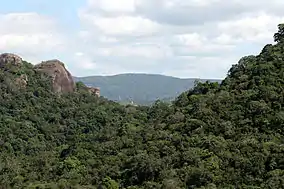 View from Kandalama Hotel Side | |
| Location | Central Province, Sri Lanka |
| Nearest city | Dambulla |
| Coordinates | 7°52′02″N 80°44′01″E |
| Governing body | Department of Archeology |
Etymology

The place got its name from a pond that had dark water at ancient times.
Archeological remains

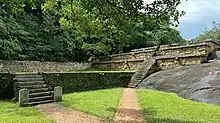
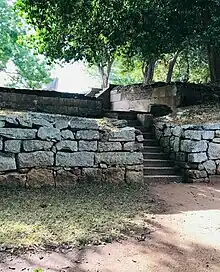


The site was initially settled in the 2nd century BC. The remains in the site include inscriptions, residences and a monastery.
Species diversity
Kaludiya Pokuna is also rich with numerous biodiversity, both flora and fauna. The forest is home for many endemic and non-endemic species of flora and fauna, that prevail much more secure than other forests in Sri Lanka.
Site is surrounded by farmland and human settlements from the north, east, and west but is undisturbed by humans and the primates are not provisioned. There is no evidence to indicate that hunting, timber extraction, or woodcutting have occurred at the site.
Forest is composed of many endemic and highly valuable trees and shrubs. The majority of flora are in the family Euphorbiaceae. Plants like Hydnocarpus venenata, Mischodon zeylanicus, Lepisanthes senegalensis, Grewia rothii, Ficus microcarpa, Mussaenda frondosa, Drypetes sepiaria, Mallotus eriocarpus, Manilkara hexandra, Dimocarpus longan, and Tetrameles nudiflora are abundant. Plants of family Ebenaceae, such as Diospyros ebenum, Diospyros malabarica, Diospyros oocarpa, and Diospyros ovalifolia, which has large timber value, are enormous without any human conflict.
Kaludiya Pokuna is rich with its populations of primate species mainly, where many researches on primates based on this site, especially on tufted gray langur and purple-faced langur. Besides them, forest is also home for the other primates in Sri Lanka, such as toque macaque and red slender loris and other herbivorous mammals, such as Asian elephants (Elephas maximus), spotted deer (Axis axis), sambar (Rusa unicolor), and wild boar (Sus scrofa). The area is also home to a full complement of potential predators such as black eagles (Ictinaetus malaiensis), crested serpent eagles (Spilornis cheela), brahminy kites (Haliastur indus), white-bellied sea eagles (Haliaeetus leucogaster), leopards (Panthera pardus), fishing cats (Prionailurus viverrinus) and Indian rock pythons (Python molurus).
Endemic snakes such as Sri Lanka flying snake, Boiga barnesii, Dendrelaphis bifrenalis, Dendrelaphis oliveri, Oligodon sublineatus are frequently seen. Venomous snakes like Indian cobra, Russell's viper and Hypnale hypnale. Numerous types of skinks and lizards are also found.
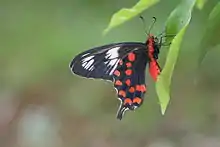
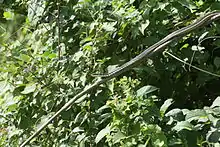
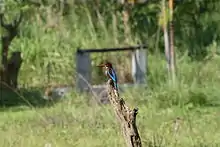
The avian diversity is much more high than all other faunal categories at Kaludiya Pokuna. It is about 120 species of birds paradise. Most common birds are Indian cormorant, Oriental darter, Indian pond heron, cattle egret, black-headed ibis and common peafowl.
Endemic birds like Sri Lanka spurfowl, Sri Lanka junglefowl, Sri Lanka grey hornbill, brown-capped babbler, Sri Lanka green pigeon, crimson-fronted barbet, greater flameback, greater racket-tailed drongo, black-capped bulbul can be seen without disturbances. It means out of 33 endemic species, 80% of endemic birds are found in Kaludiya Pokuna.
Both types of monitor lizards - Bengal monitor and water monitor, can be seen in Kaludiya Pokuna.
Butterflies and moths are also frequent in Kaludiya Pokuna. Species like crimson rose, common Mormon, Ceylon rose, common rose, common cerulean, common Indian crow, Lemon emigrant are common.
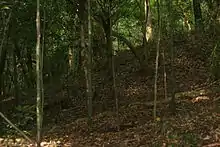



The following list provide the fauna of Kaludiya Pokuna Archeological Forest Reserve.
Birds
Aquatic birds around lakes in Kaludiya Pokuna
- Spot-billed pelican Pelecanus philippensis
- Little cormorant Microcarbo niger
- Indian cormorant Phalacrocorax fuscicollis
- Greater cormorant Phalacrocorax carbo
- Indian darter Anhinga melanogaster
- Little egret Egretta garzetta
- Great egret Ardea alba
- Gray heron Ardea cinerea
- Purple heron Ardea purpurea
- Cattle egret Bubulcus ibis
- Indian pond heron Ardeola grayii
- Intermediate egret Mesophoyx intermedia
- Eurasian openbill Anastomus oscitans
- Lesser adjutant Leptoptilos javanicus
- Black-headed ibis Threskiornis melanocephalus
- Eurasian spoonbill Platalea leucorodia
- Lesser whistling duck Dendrocygna javanica
- White-breasted waterhen Amaurornis phoenicurus
- Purple coot Porphyrio porphyrio
- Pheassant-tailed jacana Hydrophasianus chirurgus
- Yellow-wattled lapwing Vanellus indicus
- Whiskered tern Chlidonias hybrida
- Strok-billed kingfisher Pelargopsis capensis
- White-throated kingfisher Halcyon smyrnensis
Forest birds in Kaludiya Pokuna Forest
- Jerdon's baza Aviceda jerdoni
- Oriental honey buzzard Pernis ptilorhynchus
- Brahminy kite Haliastur indus
- White-bellied sea eagle Haliaeetus leucogaster
- Gray-headed fishing eagle Ichthyophaga ichthyaetus
- Crested serpent eagle Spilornis cheela
- Shikra Accipiter badius
- Black eagle Ictinaetus malaiensis
- Changeable hawk eagle Nisaetus cirrhatus
- Shaheen falcon Falco peregrinus peregrinator
- Blue-breasted quail Coturnix chinensis
- Sri Lanka spur fowl Galloperdix bicalcarata - endemic
- Sri Lanka jungle fowl Gallus lafayetii - endemic
- Indian peafowl Pavo cristatus
- Emerald dove Chalcophaps indica
- Sri Lanka green pigeon Treron pompadora
- Green imperial pigeon Ducula aenea
- Spotted dove Spilopelia chinensis
- Alexandrine parakeet Psittacula eupatria
- Rose-ringed parakeet Psittacula krameri
- Blue-faced malkoha Phaenicophaeus viridirostris
- Asian koel Eudynamys scolopaceus
- Greater coucal Centropus sinensis
- Oriental scops owl Otus sunia
- Collared scops owl Otus bakkamoena
- Forest eagle owl Bubo nipalensis
- Jerdon's nightjar Caprimulgus atripennis
- Indian swiftlet Aerodramus unicolor
- Asian palm swift Cypsiurus balasiensis
- Little swift Apus affinis
- Little green bee-eater Merops orientalis
- Blue-tailed bee-eater Merops philippinus
- Chestnut-headed bee-eater Merops leschenaulti
- Indian roller Coracias benghalensis
- Malabar pied hornbill Anthracoceros coronatus
- Sri Lanka gray hornbill Ocyceros gingalensis - endemic
- Brown-headed barbet Megalaima zeylanica
- Crimson-fronted barbet Megalaima rubricapillus - endemic
- Coppersmith barbet Megalaima haemacephala
- Golden-backed woodpecker Dinopium benghalense
- Greater flameback Chrysocolaptes stricklandi - endemic
- Indian pitta Pitta brachyura
- Barn swallow Hirundo rustica
- Red-rumped swallow Hirundo hyperythra - endemic
- Paddyfield pipit Anthus rufulus
- Flame minivet Pericrocotus flammeus
- Sri Lanka woodshrike Tephrodornis affinis - endemic
- Indian paradise flycatcher Terpsiphone paradisi
- Black-naped monarch Hypothymis azurea
- White-browed fantail Rhipidura aureola
- Black-capped bulbul Pycnonotus melanicterus - endemic
- Red-venter bulbul Pycnonotus cafer
- White-browed bulbul Pycnonotus luteolus
- Black bulbul Hypsipetes ganeesa
- Common iora Aegithina tiphia
- Golden-fronted leafbird Chloropsis aurifrons
- Jerdon's leafbird Chloropsis jerdoni
- Asian brown flycatcher Muscicapa latirostris
- Kashmir flycatcher Ficedula subrubra
- Tickell's blue flycatcher Cyornis tickelliae
- Oriental magpie robin Copsychus saularis
- White-rumped shama Copsychus malabaricus
- Black-backed robin Saxicoloides fulicatus
- Brown-capped babbler Pellorneum fuscocapillus
- Yellow-billed babbler Turdoides affinis
- Gray-breasted prinia Prinia hodgsonii
- Ashy prinia Prinia socialis
- Large prinia Prinia sylvatica
- Common tailorbird Orthotomus sutorius
- Pale-billed flowerpecker Dicaeum erythrorhynchos
- Purple-rumped sunbird Leptocoma zeylonica
- Purple sunbird Cinnyris asiaticus
- Oriental white-eye Zosterops palpebrosus
- White-rumped munia Lonchura striata
- Scaly-breasted munia Lonchura punctulata
- Common mynah Acridotheres tristis
- Indian golden oriole Oriolus kundoo
- Black-hooded oriole Oriolus xanthornus
- Black drongo Dicrurus macrocercus
- Racket-tailed drongo Dicrurus paradiseus
- Jungle crow Corvus macrorhynchos
Reptiles
- Indian rock python Python molurus
- Green vine snake Ahaetulla nasuta
- Brown vine snake Ahaetulla pulverulenta
- Common rough-sided snake Aspidura trachyprocta
- Barnes' cat snake Boiga barnesii
- Sri Lanka cat snake Boiga ceylonensis
- Forsten's cat snake Boiga forsteni
- Common cat snake Boiga trigonata
- Sri Lanka flying snake Chrysopelea taprobanica - endemic
- Common bronzeback tree snake Dendrelaphis tristis
- Green keelback snake Rhabdophis plumbicolor
- Banded kukri Oligodon arnensis
- Common rat snake Ptyas mucosa
- Black-headed snake Sibynophis subpunctatus
- Checkered keelback water snake Fowlea piscator
- Indian cobra Naja naja
- Brahminy blind snake Ramphotyphlops braminus
- Jan's blind snake Typhlops mirus
- Phillips' shieldtail Uropeltis phillipsi
- Russell's viper Daboia russelii
- Hump-nosed viper Hypnale hypnale
- Sri Lanka green pit viper Trimeresurus trigonocephalus
- Common green forest lizard Calotes calotes
- Painted-lipped lizard Calotes ceylonensis
- Whistling lizard Calotes liolepis
- Oriental garden lizard Calotes versicolor
- Lowland kangaroo lizard Otocryptis nigristigma
- Fan-throated lizard Sitana ponticeriana
- Small day gecko Cnemaspis podihuna
- Blotched ground gecko Geckoella yakhuna
- Kandian gecko Hemidactylus depressus
- Bark gecko Hemidactylus leschenaultii
- Haly's tree skink Dasia haliana
- Common supple skink Lankascincus fallax
- Common skink Eutropis carinata
- Rock skink Eutropis macularia
- Spotted skink Eutropis madaraszi
- Sarasin's snake skink Nessia sarasinorum
- Land monitor Varanus benghalensis
- Water monitor Varanus salvator
- Mugger Crocodylus palustris
- Black turtle Melanochelys trijuga
- Star tortoise Geochelone elegans
Mammals
- Asian elephant Elephas maximus
- Gray slender loris Loris lydekkerianus - ssp.nordicus
- Tufted gray langur Semnopithecus priam - ssp.thersites
- Purple-faced leaf monkey Trachypithecus vetulus - ssp.philbricki
- Toque macaque Macaca sinica - ssp.sinica
- Grizzled giant squirrel Ratufa macroura - ssp.dandolena
- Indian palm squirrel Funambulus palmarum
- Indian gerbil Tatera indica
- Lesser bandicoot rat Bandicota bengalensis
- Indian field mouse Mus booduga
- Black rat Rattus rattus
- Indian porcupine Hystrix indica
- Black-naped hare Lepus nigricollis
- Pygmy shrew Suncus etruscus
- Fulvous fruit bat Rousettus leschenaultii
- Indian flying fox Pteropus giganteus
- Fishing cat Prionailurus viverrinus
- Jungle cat Felis chaus
- Golden jackal Canis aureus
- Common palm civet Paradoxurus hermaphroditus
- Golden palm civet Paradoxurus zeylonensis
- Small Indian civet Viverricula indica
- Indian gray mongoose Urva edwardsii
- Ruddy mongoose Urva smithii
- Eurasian otter Lutra lutra
- Wild boar Sus scrofa
- Indian muntjac Muntiacus muntjak
- Spotted deer Axis axis
- Sambar Rusa unicolor
References
- Vandercone, Rajnish P.; Dinadh, Chameera; Wijethunga, Gayan; Ranawana, Kitsiri; Rasmussen, David T. (2012). "Dietary Diversity and Food Selection in Hanuman Langurs (Semnopithecus entellus) and Purple-Faced Langurs (Trachypithecus vetulus) in the Kaludiyapokuna Forest Reserve in the Dry Zone of Sri Lanka". International Journal of Primatology. 33 (6): 1382–1405. doi:10.1007/s10764-012-9629-9.
- "Kaludiya Pokuna handed over to Kandy High School". Lankadeepa. Retrieved 27 April 2021.
- "Kaludiya Pokuna under Kandy High School". hirunews. Retrieved 27 April 2021.
External links
- Kaludiya Pokuna at the website of the Department of Archaeology of the Sri Lanka government
- Green Pradise' of Kandalama, The Sunday Times Sri Lanka